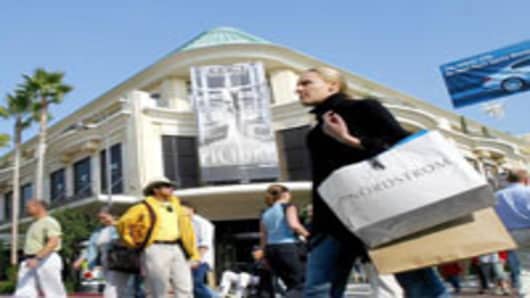The $48 billion in tax rebates sent out to American consumers this spring has helped keep the US economy out of a recession, but analysts believe the impact may only be temporary.
The rebates, approved by Congress earlier this year, helped push May retail sales up at twice the expected rate. But consumers are still facing rising gas costs, falling home prices and the struggling job market, so the rise is probably short-term, says Mark Zandi, chief economist for Moody's Economy.com.
"Come October, there are probably going to be weaker numbers," Zandi said. "People are spending the rebate checks very quickly, so the stimulus is going to fade very quickly."
Some recipients reportedly spent their money back in April, before they even received the checks, Zandi said. Only 29 percent of shoppers saved their checks, while 41 percent of households used them to pay off credit cards or mortgage debts, according to TNS Retail Forward.
About 28 percent of consumers reportedly used their rebates for everyday expenses like gas and groceries, while only 14 percent used them for special purchases, such as jewelry, according to the research and consulting firm.
Supermarkets, discount chains, consumer electronics stores and online retailers have benefited the most from rebates, with discounters such as Wal-Mart
and Target posting their largest sales increases in 14 months.
Still, shoppers are still in a "belt-tightening mode," and the retail trend significantly weakens when the checks are taken out of the mix, says Frank Badillo, senior economist for Retail Forward.
"From what shoppers are telling us, they are looking to cut back their spending pretty much across the board," he says. "The stimulus checks are hiding that."
Badillo predicts the rebate checks will further extend the economy's growth rate into the third quarter but will tail off in the fourth, he said.
Bill Seidman, a consultant for RBW Capital Management and CNBC contributer, disagrees, saying the checks will provide a more permanent boost to the economy.
"The consumer seems to be hanging in there despite oil and gas prices, despite all the uncertainties in the job market," he says. "What it says is we don’t have a recession and aren’t going to have one."
—Reuters contributed to this report


